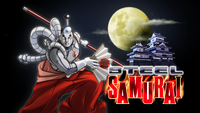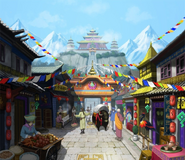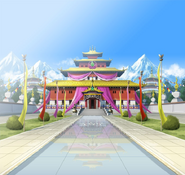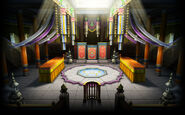| This article contains information about Ace Attorney media that has been recently released and thus likely contains spoilers! | |
|---|---|
| The information in this article comes from a game, demo, or other media that has been recently released worldwide. This article may need input from an editor who has personal experience with the media in question. If you have, you can help the Ace Attorney Wiki by expanding this article. Please heed the manual of style when adding information.
Readers of this page should be aware that this article likely contains MAJOR SPOILERS concerning the media in question. You have been warned! | |
- This page is about the country known as Khura'in. For the similarly-named village near Los Angeles, see Kurain Village. For other uses, see Kurain (disambiguation).
| The Kingdom of Khura'in, a country of spirit mediums and faith on the western edge of the Far East. Its people's lives are nourished through the wisdom of Khura'inism and protected by its founder, the Holy Mother. At least, that's how it used to be. |
The Kingdom of Khura'in is an Enatic-Cognatic succession absolute monarchy at the western edge of the Himalayan mountains, between China, India, Nepal and Bhutan. It is a deeply religious land dating back to the 7th century, whose people worship and revere the founder, calling her the Holy Mother.[1] The kingdom is ruled by the Holy Mother's descendants, who have the power of Spirit Communion. The country's religion, Khura'inism, tells of people's souls, represented by "mitamah", going to the "Twilight Realm" after the body has passed away.[1] Among the country's myths is the story of Lady Kee'ra, a warrior who protected Khura'in during a time of conflict. The show The Plumed Punisher: Warrior of Neo Twilight Realm is based on this legend.[2] Khura'in's currency is the Khura'inese dahma.
Court system
- Main article: High Court of Khura'in
During the course of Khura'in's history, its murder trials implemented a process known as the Divination Séance, in which a "Pool of Souls" is used to reveal what the victim saw and felt in the moments before their death.[3][4][5][1] In addition to this, the Khura'inese court implemented the Defense Culpability Act, a law stating that an attorney would be given the same punishment as their defendant should they be found guilty.[6] With these two changes to the court system, every defendant was found guilty and sentenced to death, and their lawyers were condemned with them. The court effectively did away with arguments between a prosecutor and a defense attorney and, due to the perceived indisputable decisiveness of the trials, became known as the "Court of Resignation".[7]
Lawyers in the country were rounded up and executed in a widespread purge, though some remnants have formed a resistance group called the Defiant Dragons.[8] There seems to be a religious element to the purge, as Nahyuta Sahdmadhi, a prosecutor from the country, speaks as though the defense attorney profession is a sinful and unenlightened walk of life that insults the victims of crime, deferring to the founder to "pass judgment" on rogue defense attorneys who are stood before him.[9] The culture of Khura'in likewise shuns defense attorneys, casting hateful scorn upon those who would stand behind the bench in their present society.[10] Although some defendants beg for representation and their cries go unheeded by the court,[9] others, such as Ahlbi Ur'gaid, make opposite pleas, asking their court representatives to cease their defense as a result of this distrust and ridicule.[10]
Khura'in's legal system is overseen by the office of the Minister of Justice, a position that was held by Inga Karkhuul Khura'in.
Development
- According to Janet Hsu, Khura'in is located near Nepal and is based on countries in the general vicinity of the Himalayas,[1] such as Bhutan and Tibet. Japanese trailers of Phoenix Wright: Ace Attorney: Spirit of Justice originally described the country as being located in the far west of Asia.
- The characters for the Khura'inese language are stylized hiragana turned upside-down. An example of this is a curse spoken by Nahyuta Sahdmadhi that, when turned upside-down, is revealed to be the following hiragana: "さとら・いまおまん・どもさまし・でたしぬけ・たれがさよ・そのか!" (Satora imaoman domosamashi detashinuke taregasayo sonoka!).[11] These hiragana can be rearranged to read "さとらぬ・けがれた・たましいよ・しそさまの・かおも・さんどまで". (Satoranu kegareta tamashiiyo shisosamano kaomo sandomade), meaning "Oh unenlightened, tainted soul. Even the founder's patience has its limits." [12]
Gallery
References
- ↑ 1.0 1.1 1.2 1.3 Capcom Live From E3 2016! Retrieved 2016-06-15.
- ↑ Bolt Storm. Ace Attorney: Spirit of Justice: Case 3 Detailed. Court Records Forums. Retrieved 2016-05-15.
- ↑ "【先出し週刊ファミ通】シリーズ最新作となる『逆転裁判6』が発表!(2015年9月3日発売号)". Famitsu. Retrieved on 2015-09-01.
- ↑ Bolt Storm. "Ace Attorney 6 in Famitsu 9/3/15 - full scans". Court Records Forums. Retrieved on 2015-09-02.
- ↑ Bolt2nd "[Subbed!] Ace Attorney 6 - TGS 2015 Trailer". YouTube. Retrieved on 2015-09-18.
- ↑ Kellen. "Ace Attorney Character Profiles: Phoenix Wright and Rayfa Padma Khura'in". Capcom Unity. Retrieved on 2016-08-17.
- ↑ Capcom. "CAPCOM:逆転裁判6 公式サイト". Retrieved on 2015-09-21.
- ↑ Bolt Storm. Ace Attorney 6 in Famitsu 5/10: Case 3, Simon, and Edgeworth. Court Records Forums. Retrieved 2016-05-15.
- ↑ 9.0 9.1 スペシャル短編アニメ「逆転裁判6 プロローグ」 Retrieved on 2016-03-17
- ↑ 10.0 10.1 dowolf. Ace Attorney 6 Demo [ENG sub] Posted 2016-03-07. Retrieved on 2016-04-11.
- ↑ "クライン文字がひらがな逆転説はありえそうな気がしてきた。(ふうねさんありがとうございます)" ほそぼそ on Twitter. Retrieved on 2016-05-12.
- ↑ http://www.forums.court-records.net/viewtopic.php?p=1357407&sid=5e85bebc1737f96ad2193367e80fd979#p1357407 2016-07-05. Retrieved on 2016-09-20.




